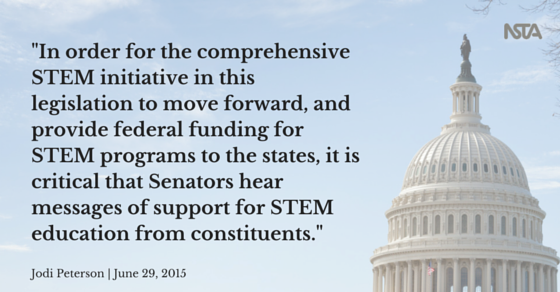Legislative Update
ESEA (No Child Left Behind) Reauthorization Bill Scheduled for Senate Action July 7
By Jodi Peterson
Posted on 2015-06-29
The Senate debate on the reauthorized Elementary and Secondary Education Act (known as No Child Left Behind) could start on July 7. According to Education Week, Senate Majority Leader Mitch McConnell has officially scheduled the bill—the Every Child Achieves Act (S. 1177)—for floor action following the July 4 recess.
This action comes days after 10 major education groups—including the National Education Association, the American Federation of Teachers, the Council of Chief State School Officers, the American Association of School Administrators, National PTA, and the National Association of State Boards of Education, sent a letter to Senators urging immediate action on the bill.
As reported in the April 17 NSTA Legislative Update, thanks to the leadership of Senator Al Franken (D-MN), Mark Kirk (R-IL), and Patty Murray (D-WA), an amendment to include a dedicated STEM K-12 program in the Every Child Achieves Act was adopted (by a vote of 12-10) when the bill was considered by the Health, Education, Labor and Pensions (HELP) Committee. This will ensure that states would continue to receive dedicated support for STEM activities from the U.S. Department of Education. The language stipulates that each state would receive formula-based funding to support partnerships between local schools, businesses, universities, and non-profit organizations to improve student learning in the critical STEM subjects. Each state would choose how to spend and prioritize these funds, which can support a wide range of STEM activities from in-depth teacher training, to engineering design competitions, to improving the diversity of the STEM workforce.
The Every Child Achieves Act also retains the current federal testing requirement—students would continue to be tested in English and math in third through eighth grades as well as once in high school, and science tests would also be administered three times between third and 12th grade—but the language does away with the current NCLB accountability provisions and allows states to develop their own accountability systems.
Read the April 10 NSTA Legislative Update on the Every Child Achieves Act.
In order for the comprehensive STEM initiative in this legislation to move forward, and provide federal funding for STEM programs to the states, it is critical that Senators hear messages of support for STEM education from constituents.
We have set up a sample letter, which you can personalize and send directly to your Senators, on the STEM Education Coalition website to help you do this. Please take a moment to contact your Senators now
In the House, National Journal is reporting that House leaders will also be bringing their bill to reauthorize No Child Left Behind (the Student Success Act) back for floor debate, and will allow new amendments that would allow schools to keep federal money but opt out of the federal regulations that come with it, and a possible amendment to create a voucher system. The bill was on the House floor earlier this spring, but was pulled from consideration by House leaders before a vote on final passage.
Senate Appropriations Sub-Committee Advances Education Funding Bill: Both the House and Senate Appropriations LHHS/Education subcommittees have passed their FY 16 spending bills, and once again House funding for the Math and Science Partnership program at the U.S. Department of Education was eliminated. Report language on the House LHHS Education bill follows:
Mathematics and Science Partnerships. “The Committee recommends no funding for Mathematics and Science Partnerships, which is $152,717,000 below the fiscal year 2015 enacted level and $202,717,000 below the budget request. This program provides professional development for math and science teachers; these activities can be carried out under other authorities funded in this bill and through other federal agencies such as the National Science Foundation.”
The Senate education funding bill did provide continued support for the Math and Science Partnership program at the Department of Education, at $149 million. We are watching this activity and will stress that the final funding agreement include the Senate funding level.
Stay tuned and look for upcoming issues of NSTA Express for the latest information on developments in Washington, D.C.
Jodi Peterson is Assistant Executive Director of Legislative Affairs for the National Science Teachers Association (NSTA) and Chair of the STEM Education Coalition. e-mail Jodi at jpeterson@nsta.org; follow her on Twitter at @stemedadvocate.
The mission of NSTA is to promote excellence and innovation in science teaching and learning for all.
Follow NSTA
Disclaimer: The views expressed in this blog post are those of the author(s) and do not necessarily reflect the official position of the National Science Teaching Association (NSTA).



